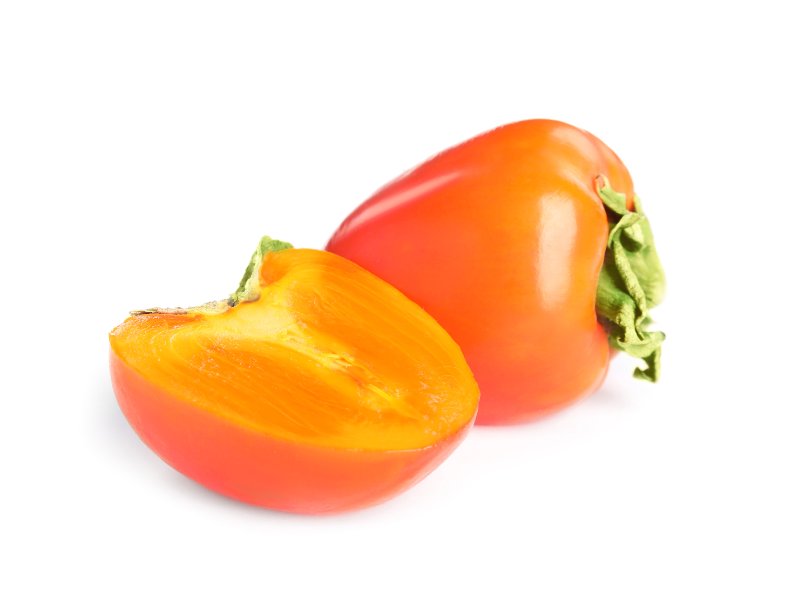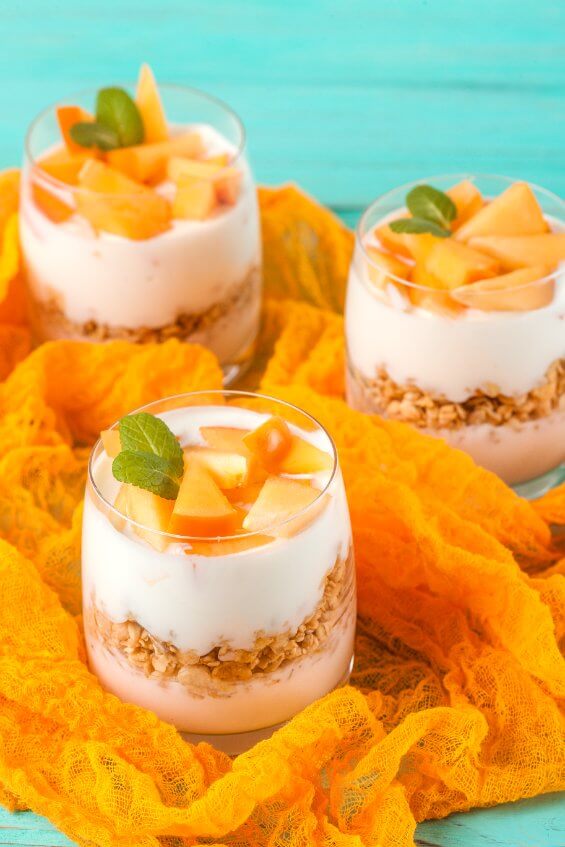Persimmons are one of the most unique and exotic fruits in existence. Although they may fool you for a tomato at first glance, they most certainly are not. The persimmon is a tasty fruit that is described as having a mild and rich flavor, and in this article we’ll be exploring some of the benefits of persimmons you’ll enjoy when incorporating them into your diet.
Persimmons are grown all over the world, but in the US they are grown mostly in Florida, according to the Gardening Know How website. However, it should be noted that there are various types of persimmons– all of which may grow in different regions.
Benefits Of Persimmons

The benefits of permissions are abundant. Whether it be for nutrition, health, or culinary enjoyment, persimmons have much to offer. Let’s delve into some of these benefits, starting with nutrition.
The table below outlines the nutrition facts of a single persimmon fruit which is roughly 2.5 inches in diameter:
| Item | Persimmon Fruit |
| Serving Size | 1 fruit, 2.5″ diameter |
| Calories | 118 |
| Total Carbohydrates | 31.2g |
| Fiber | 6g |
| Total Fat | 0.3g |
| Saturated Fat | 0g |
| Protein | 1g |
| Iron | 1% DV |
| Calcium | 1% DV |
| Magnesium | 4% DV |
| Potassium | 8% DV |
| Copper | 9% DV |
| Manganese | 30% DV |
| Vitamin A | 55% DV |
| Vitamin C | 21% DV |
| Vitamin E | 6% DV |
| Vitamin K | 5% DV |
| Vitamin B6 | 8% DV |
As you can see, persimmons have much to offer for such a modest quantity of food. Let’s elaborate.
1. They’re Low In Calories
One of the greatest benefits persimmons have to offer is the fact that they’re a fruit, and whole plant foods, in general, tend to be lower in calories than much of the processed foods that make up the bulk of Western diets.
Calories matter because they’re the unit of measurement used to gauge the energy we consume through food and expend through activity. If weight loss is the goal then consuming less calories than your body uses is the only way to make that happen, according to Mayo Clinic.
A single persimmon fruit that is roughly 2.5″ in diameter contains a meager 118 calories! This means that by opting for fresh fruits, such as persimmons, you can consume a greater volume of food for fewer calories than traditional processed snacks, helping you feel satiated longer.
2. Packed with Fiber
One of the greatest benefits persimmons have to offer is their fiber content. A single persimmon fruit that is roughly 2.5″ in diameter packs a whopping 6g of dietary fiber— and for only 118 calories!
Fiber is important because it is used to remove waste from the body, among other things. According to Mayo Clinic, a high-fiber diet can:
- Help maintain good bowel health
- Lower cholesterol levels
- Control blood sugar
- Aid in weight loss
- And more
Persimmons provide a great opportunity to get more fiber in your diet.
3. Low In Fat
Not only are persimmons an excellent source of nutrition, but they’re also low in fat– particularly saturated fat, the “bad” kind, according to the American Heart Association.
A single persimmon fruit contains a meager 0.3g of total fat, none of which is saturated. Instead, the pittance of fat content in persimmons consists entirely of healthy unsaturated fats.
4. Provides Nearly Half Of The Daily Value for Vitamin A
Vitamin A, also known as retinol, is an essential vitamin that’s important for vision, reproductive health, and immunity, according to Mayo Clinic.
Vitamin A mostly comes from leafy greens and vegetables, as well as certain fruits and vegetables with orange color (such as cantaloupe and sweet potato.) If those types of foods aren’t your first choice of meals, then persimmons may be the perfect alternative, providing 55% of the daily value in just a single fruit.
5. Persimmons Are Loaded with Antioxidants
Persimmons are also loaded with antioxidants, which are important for protecting cells from free radical damage. Antioxidants scavenge these harmful toxins that can damage cells, leading to inflammation.
Inflammation is a natural process that occurs when the body’s immune system is activated in response to infection or injury. However, chronic inflammation has been linked to a host of diseases and health conditions, such as heart disease, arthritis, and cancer, according to Harvard Health.
Eating a diet rich in antioxidants, such as those found in persimmons, can help to protect against chronic inflammation and the diseases associated with it.
6. A Good Source Of Vitamin C
One of the quintessential benefits of persimmons is that they pack a modest amount of vitamin C, clocking in at 21% of the daily value for just a single fruit.
Vitamin C is important because it plays a role in supporting immune health and collagen production, according to the National Institutes of Health. It also acts as an antioxidant.
7. Lots Of Other Vitamins & Minerals Too
The nutritional benefits of persimmons don’t stop there. Persimmon fruits also contain many other vitamins such as:
- Vitamin E, which is important for skin and eye health.
- Vitamin K, which is important for blood clotting
- Vitamin B6, which is important for metabolism.
Persimmons also contain minerals as well, such as:
- Magnesium
- Potassium
- Copper
- Manganese
8. A Good Source Of Potassium
An essential mineral and electrolyte, potassium plays many critical roles within the body. It helps manage fluid balance, muscle contraction, and even blood pressure. In fact, potassium can even normalize blood pressure by relaxing the walls of the blood vessels, according to Harvard Health Publishing.
Many foods contain potassium, but the most abundant sources tend to be fruits and vegetables. This includes persimmons as well, seeing as how a single fruit contains 270mg of potassium, or 8% of the daily value.
9. Persimmons Are A Winter Fruit

Did you know that persimmons are a winter fruit? Ripening in the fall and into the winter months, persimmons are unlike many other fruits in that they can be enjoyed during those frigid winter days.
Not only does this make for a tasty winter-time treat, but it also provides essential vitamins and minerals during a time of year when the other foods you might rely on for such nutrients may be unavailable.
10. A Taste & Texture Like No Other Fruit
One of the most unique benefits of persimmons is their mild and aromatic flavor, as well as their gelatin-like texture.
In fact, persimmons often contain little pockets of flavorful jelly– a trait you’ll be hard-pressed to find in other fruits.
In a video uploaded to YouTube, user “BeatTheBush DIY” slices open a persimmon to reveal its unique texture:
The jelly pockets, which extend out from the core, can be sliced off with a knife and enjoyed.
As far as taste goes, one Reddit user describes persimmon fruit as having a bland, but also sweet, taste. But only so long as they are ripe.
Ripe persimmons should fall off the tree with very little effort. If not fully ripe they can have an astringent taste.
11. They Add Flavor To Smoothies
The advantages of introducing persimmons in your diet extend far beyond health and nutrition. They also come with lots of culinary benefits as well, one of which would be smoothies.
Take this persimmon banana breakfast smoothie for example. In this delectable recipe, persimmons are combined with bananas, chia seeds, milk, and honey to make a quick and tasty breakfast smoothie for those mornings when you’re short on time.
12. Makes For A Great Salad Topping
Another great way to incorporate persimmons into your diet is by using them as a salad topping.
Not only do they look great on top of a salad by adding vibrant color, but their unique taste and texture can also help to enhance the flavor and overall experience of your meal.
A sample persimmon salad recipe might include:
- 1 cup chopped persimmon
- 1/2 cup chopped celery
- 1/4 cup chopped red onion
- 2 tablespoons white balsamic vinegar
- 1 tablespoon of honey
- Salt & pepper to taste
Add these ingredients to suit your own taste and enjoy!
13. Can Be Pureed And Made Into Bread
There’s no shortage of ways in which you can use persimmons. One of their greatest advantages is how versatile they are.
Fresh persimmons can be pureed and used to create many delectable dishes. One such example would be this persimmon bread recipe by Natasha’s Kitchen. In this recipe, 3 cups of pureed persimmons are combined with eggs, honey, vanilla extract, and other ingredients, to make a fresh and tasty loaf of bread.
Furthermore, any unused persimmon puree can be frozen and stored for future use.
14. Endless Dessert Possibilities

Finally, persimmons can be used to make countless desserts and snack items. Some examples include:
- They can be dried and made into Hoshigaki— a sweet and chewy Japanese tea treat.
- Persimmon pudding— a quick and simple dessert that pairs pureed persimmon with vanilla ricotta.
- And let’s not forget persimmon chocolate chip cookies— a sweet snack that pairs chocolate with the richness of persimmons.
The Bottom Line
The benefits of persimmons do not stop here. There are countless ways in which you can put this exotic fruit to good use. Whether you’re looking for a winter treat or to boost your intake of essential vitamins and minerals, persimmons have much to offer.

